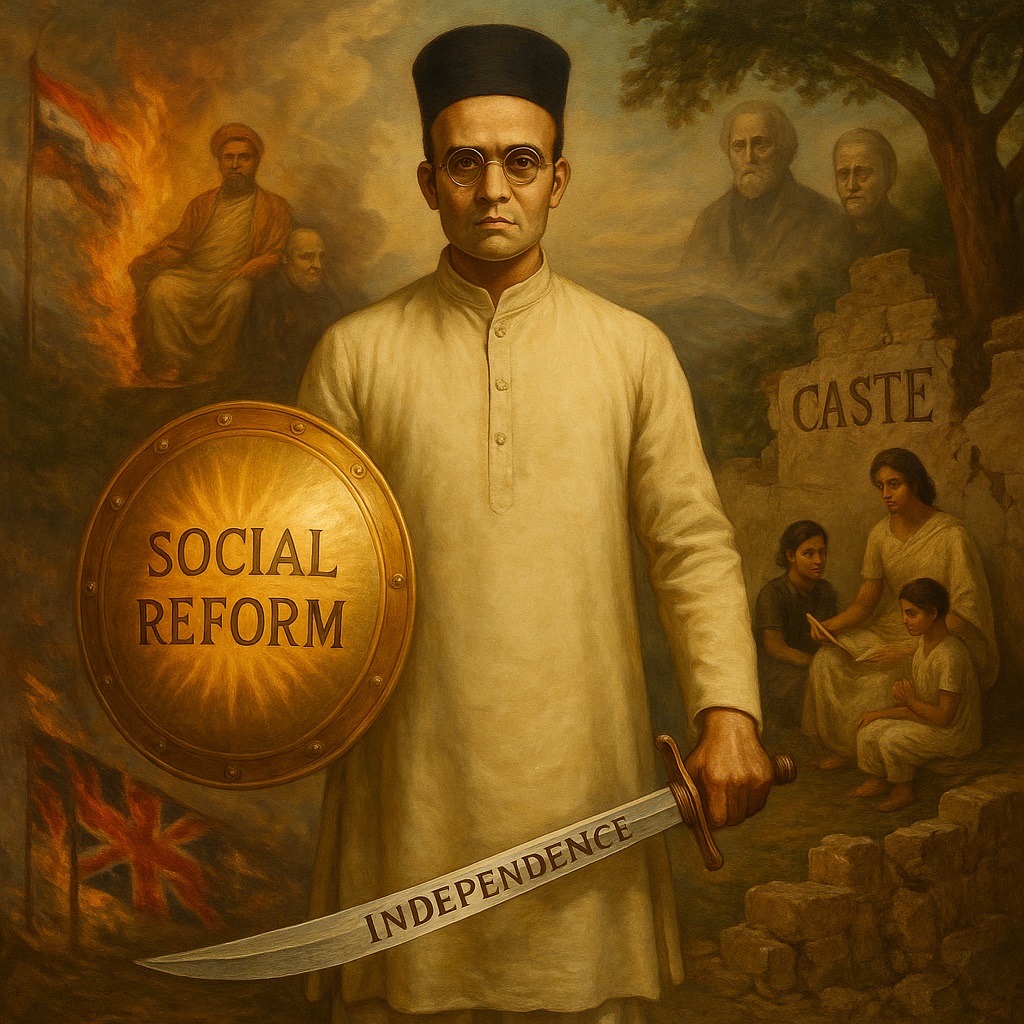Social-Reformist Dimension of Hindutva, Part 3
Savarkar: The Social Reformer Who Saw Beyond Political Independence
Vinayak Damodar (Veer) Savarkar was more than just a political figure. He was a profound social reformer who understood the intrinsic link between social transformation and lasting political freedom. While his political contributions are widely recognized, his insights into the necessity of social reform deserve equal attention.
Savarkar’s core argument was simple yet revolutionary: a deeply fractured Hindu social system, riddled with inequalities, would ultimately undermine any political independence achieved. He believed that the internal contradictions within Hindu society were so severe that political struggles, without accompanying social reforms, would prove futile in the long run.
Navigating the Poona Controversy:
The heated debates of the Poona Controversy, centered on whether social reforms should precede or follow political independence, threatened to paralyze reform efforts. Savarkar, in his autobiography, deftly navigated this complex landscape. He acknowledged the importance of both political independence, as advocated by his “political mentor” Bal Gangadhar Tilak, and social reforms, championed by Gopal Ganesh Agarkar.
However, Savarkar diverged from Tilak’s orthodox views. Tilak’s religiously oriented political thinking, rooted in the Vedas, led to a partial rejection of Western social, political, and economic concepts and a reluctance to prioritize social reform. Savarkar, in contrast, found himself more aligned with the progressive views of Mahadev Govind Ranade and Agarkar.
Beyond Territorial Independence
Savarkar’s vision extended beyond merely achieving political independence. He emphasized the crucial need to preserve and consolidate that freedom. He argued that political freedom, without fundamental social transformation, would lack stability and continuity. While acknowledging that political independence was essential for sustained social reform efforts, he insisted on initiating reforms that would ensure the lasting freedom of Hindus.
He astutely pointed out that territorial independence alone did not constitute a nation. For Savarkar, true nationhood required social cohesion and equality. He recognized the interconnectedness of political power and social reform, stating that both were essential for India’s progress. He urged consistent efforts to create a future where social justice and political freedom went hand in hand.
The Sword and the Shield
In a powerful analogy, Savarkar described politics as a sword and social reforms as a shield. He emphasized that both were complementary and that one was ineffective without the other. This metaphor encapsulates his belief that political strength without social justice was ultimately hollow.
Mazzini’s Influence
Savarkar’s understanding of the connection between social issues and political missions was significantly influenced by Giuseppe Mazzini. Mazzini’s belief in addressing the people’s material well-being resonated deeply with Savarkar. Mazzini argued that inspiring people towards higher goals required liberating them from poverty, oppression, and intellectual distress. He envisioned a future where the people, ennobled by the awareness of their rights and duties, would rise to a unified faith and patriotism.
Mazzini’s vision, emphasizing that liberation movements should be “of the people and for the people,” reinforced Savarkar’s conviction that social reform was not merely a desirable addendum to political independence but an indispensable prerequisite.
A Lasting Legacy
Savarkar’s insights into the interconnectedness of social reform and political freedom remain relevant today. He reminds us that true progress requires addressing not only external threats but also internal inequalities. His legacy serves as a powerful reminder that building a strong and just nation necessitates a holistic approach that prioritizes both political and social transformation.
Final Thoughts
Savarkar was not just a political revolutionary, but a social visionary. His understanding of the crucial connection between social reform and political independence positions him as one of Maharashtra’s and India’s most significant reformers. His insistence on building a society free from internal divisions and injustice remains a powerful call to action for every generation.
Sources:
GODBOLE, Vasudev Shankar. 2004. Rationalism of Veer Savarkar. Itihas Patrika Prashan: Thane/Mumbai.
KELKAR, B. K. 1989. „Harbinger of Hindu Social Revolution“, in SWATANTRYAVEER SAVARKAR RASHTRIYA SMARAK. 1989. Smarak Inauguration. 28 May 1989. Festschrift. Swatantryaveer Savarkar Rashtriya Smarak: Bombay (Mumbai), 49-51.
NAG, Jamuna. 1988. Social Reform Movements in Nineteenth Century India. RBSA Publishers: Jaipur.
PHADTARE, T. C. 1975. Social and Political Thought of Shri V.D. Savarkar. A Thesis submitted to the Marathwada University for the Degree of Doctor of Philosophy. Unpublished: Aurangabad.
WICHTERICH, Richard. 1937. Giuseppe Mazzini. Der Prophet des neuen Italien. Keil Verlag: Berlin.


Leave a Reply